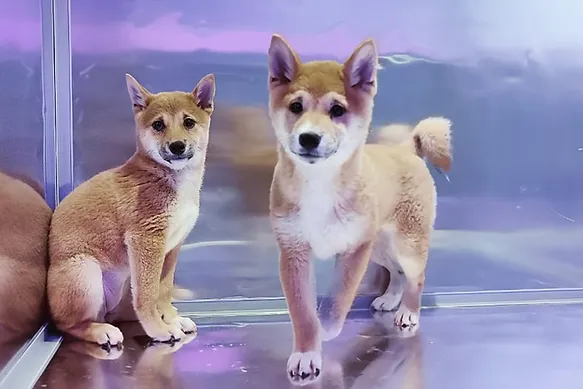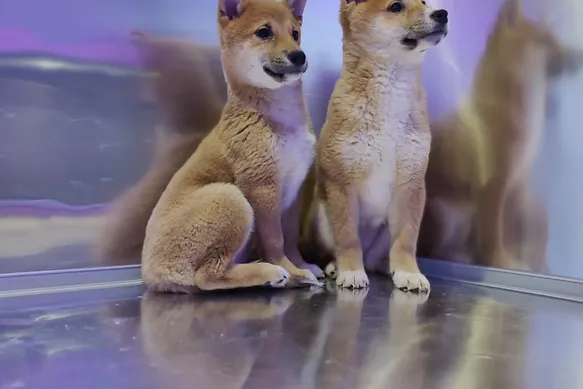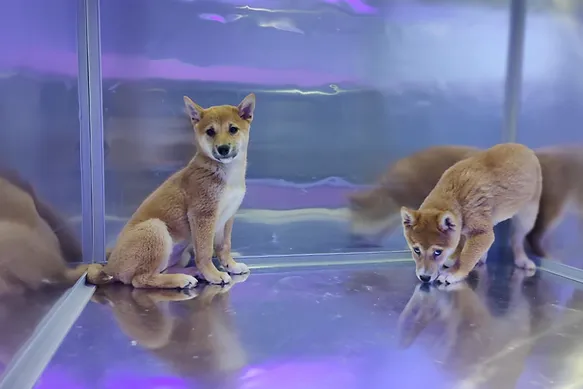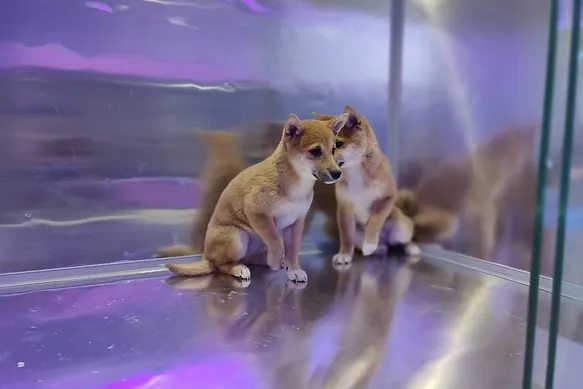Introduction
Shiba Inus are an interesting breed distinguished by their lively temperament and distinctive features. They are small to medium-sized canines that originated in Japan and resemble foxes. Their curled tails, luxurious double coats, and attentive expressions define them. Shiba Inus are well known for their independence, wit, and stubbornness, which make them interesting and demanding friends. When it comes to their family, they are devoted and loving, yet they might be distant from others. Shiba Inus make dedicated and affectionate pets when they receive the right training and socialization. To use their energy constructively, they need strong leadership, cerebral stimulation, and frequent exercise.
Height: Males 39.5 - 41.5 cm Females 36.5 - 38.5 cm
Average weight: Males 8.0 - 11.0 kg Females 6.8 - 9.0 kg
Appearance
Japanese Shiba Inus are little dogs with a large cranium, tapering muzzle, and forward-curling triangular ears that resemble miniature Akitas. They have powerful jaws with a scissor bite, and almond-shaped, dark brown eyes. Their sloping shoulders and straight, well-developed forelegs are the result of their powerful necks. They have an athletic build, with deep chests, level backs, and high withers. Strong hind legs allow them to support a thick, curly tail. Shiba Inus have a thick undercoat and a double coat of straight, firm outer hair, with longer tail fur. Kennel Club registration accepts the following colors: Black & Tan, Red, Red & White, Red Sesame, Sesame, and White. All in all, they have a lovely appearance with distinguishing traits that belong to the breed.
History
Because of their identical appearance, Japanese Shiba Inus are said to be a very old breed, having originated thousands of years ago, according to ceramics from the third century BC. Around 6000–7000 BC, immigrants probably transported their dogs to Japan and crossed them with native dogs to create spitz-type canines with curled tails and pointed ears. Shinshu, Mino, and Sanin were the three primary varieties of Shibas that were originally named after their respective areas. The Shiba Inu, which by 1936 had become one of Japan's national treasures, was one of the native breeds that the "Organisation to Preserve the Japanese Dog" was founded in 1928 to protect. Through breeding programs, the breed was able to persist despite having low numbers because of outbreaks and conflicts.
Temperament
Playful and alert, the Japanese Shiba Inu breed builds close relationships with its owners. When they get to know someone, their initial fear of strangers turns into affection. Their habits include perching on chairs, self-grooming, and purring when they are handled. Called "big dogs in small bodies," they can be aggressive and even show dominance if not educated at a young age. Early socialization is essential for ensuring kindness and preventing hyperactivity. They need regular boundaries and training because they are intelligent and want to please. Their innate independence necessitates careful training to limit their boldness. Although Shiba Inus are talkative dogs who may "yodel" for attention, excessive barking may be controlled with the right training. Additionally, early teaching helps avoid possessiveness towards food and toys.
Training Your Shiba Inu: Tips for Success
Because of their intellect and stubbornness, training a Shiba Inu may be enjoyable and tough at the same time. Training sessions should be brief and engaging to keep participants focused and avoid boredom. It is imperative to initiate puppy lessons following vaccines and provide them with early and consistent training to set expectations and socialize them successfully.
They have a strong prey drive and, therefore pay particular attention to the "recall" command. Establishing ground rules early on is essential since Shiba Inus rapidly acquires good and negative habits. Early obedience training that includes orders like "Come," "Sit," "Stay," "Quiet," "Leave it," "Down," and "Bed" helps prevent dominating behavior tendencies and builds a solid basis for obedience. Consistent training and positive reinforcement are key to shaping a well-behaved Shiba Inu.
Health Considerations for Shiba Inus
When given appropriate care and an age-appropriate, high-quality diet, the average lifespan of a Japanese Shiba Inu is approximately 12 to 15 years. Shiba Inus, like many other breeds, are susceptible to some inherited health problems, though. These comprise hip dysplasia, entropion (folding of the eyelids inward), hereditary cataracts, allergies, hypothyroidism, dental issues, heart murmurs, glaucoma (both primary and secondary), and ear infections (caused by narrower ear canals). It's critical to be aware of these possible health issues for your Shiba Inu and to collaborate closely with your veterinarian to provide proper preventive care and early intervention when needed to safeguard your dog's wellbeing. A proactive approach to their healthcare and routine check-ups can help lessen the effects of these conditions.
Spaying and neutering?
These days, many veterinarians advise against spaying and neutering dogs until they are a little older, or more mature, before carrying out the surgeries. As a result, they recommend neutering male dogs and spaying female dogs between the ages of six and nine months, and occasionally even up to twelve months. Some veterinarians advise spaying and neutering dogs no earlier than six months of age unless there are medical grounds for doing so. Having said that, since every breed is unique, it is always a good idea to consult a veterinarian and heed their advice regarding the appropriate time for a dog to be neutered or spayed.
Your cherished pets can get complete spaying and neutering services at Supervet Pet Clinic Dubai. Our skilled veterinarians put your pets' health first and can provide knowledgeable advice on when these treatments should be performed. Throughout the process, we offer individualized attention and compassionate care with an emphasis on comfort and safety. For the best spaying and neutering procedures in a loving and caring setting, rely on Supervet Pet Clinic Dubai.
Caring for Your Shiba Inu Puppy
Puppy-proofing your house and yard is a necessary step in preparing for a Japanese Shiba Inu puppy to guarantee their safety. Although a reputable breeder's socialization helps puppies develop confidence, they may first feel defenseless. Establish a peaceful space for naps and quiet indoor playtime. Their growth depends on feeding them high-quality food and following a worming plan at six, eight, ten, and twelve months. Microchip information and worming dates should be included in the breeder's documentation. It's crucial to keep electrical cables out of reach and to remove potential hazards like poisonous plants and sharp objects. Your Shiba Inu puppy will flourish and grow to be a beloved member of your family with the right care and attention.
Grooming
The Japanese Shiba Inu is renowned for possessing a thick double coat made up of an exterior coat that is straighter and stiffer than the inner coat, which is velvety and dense. All year long, they shed a lot of hair, but especially in the spring and autumn, when more frequent brushing is normally required to stay on top of things and get rid of loose and dead hair. Playing with a puppy's paws helps ease their anxiety when it comes to nail clipping, which can lead to a lot of issues later on because these canines don't like to have their paws touched.
Exercise and Mental Stimulation for Shiba Inus
The clever and high-energy Shiba Inu breed needs mental stimulation and enough daily exercise to stay healthy. To avoid boredom and destructive behaviors, they require 40 to 60 minutes of exercise every day, including time spent off-leash in safe settings. Shorter excursions in the morning are acceptable, but longer, more interesting treks in the afternoon are important. They can let off steam in a safe backyard, but the fencing needs to be sturdy to keep them in.
Shiba Inu puppies should not be overly exercised because their joints and bones are still growing. Avoiding repetitive motions such as leaping on and off furniture or stairs can help prevent future joint and spine issues. Encouraging Shiba Inus with proper exercise and mental stimulation guarantees their happiness.
Why Petholicks Pet Shop is the Best Place to Buy a Shiba Inu
For Shiba Inus, Petholicks Pet Shop is the greatest store to purchase one. Petholicks is known for their high standards and dedication to the welfare of their animals. They guarantee that all Shiba Inus that are offered for sale are healthy, well-socialized, and from reliable breeders. Their experienced staff members are committed to assisting you in finding the ideal Shiba Inu puppy to add to your family, providing direction and encouragement at every stage. Petholicks places a high priority on the well-being and health of their puppies, carrying out extensive health examinations and supplying all required paperwork. You can be sure that you are obtaining a premium Shiba Inu puppy from a reliable source when you use Petholicks Pet Shop, as they offer outstanding customer care and continuous support for you and your new furry friend.
Conclusion
To sum up, Shiba Inus is renowned for its lively disposition and distinct appeal. The dedication of Petholicks Pet Shop to excellence and client satisfaction makes owning a Shiba Inu an enjoyable experience for both the owner and the cherished animal. Set off on the path of Shiba Inu ownership with assurance, knowing that Petholicks offers unmatched assistance and direction at every turn.
FAQS
Are Shiba Inus good with children?
Shiba Inus can be good with children when raised together from a young age and properly socialized. However, supervision is recommended, especially with younger children, due to the Shiba's independent nature.
Does Shiba Inus shed a lot?
Yes, Shiba Inus sheds seasonally and requires regular grooming to manage their shedding. Daily brushing during shedding seasons can help minimize loose hair around the house.
Are Shiba Inus easy to train?
Shiba Inus are intelligent but can be stubborn, which may make training challenging. Consistent training using positive reinforcement techniques is key to success with this breed.
How much exercise does Shiba Inus need?
Shiba Inus are energetic dogs that require daily exercise to stay healthy and happy. They enjoy brisk walks, interactive play sessions, and mental stimulation activities.
What health problems are common in Shiba Inu?
Common health issues in Shiba Inu include hip dysplasia, patellar luxation, allergies, and certain eye conditions. Regular veterinary check-ups and a healthy lifestyle can help mitigate these risks.




Comments